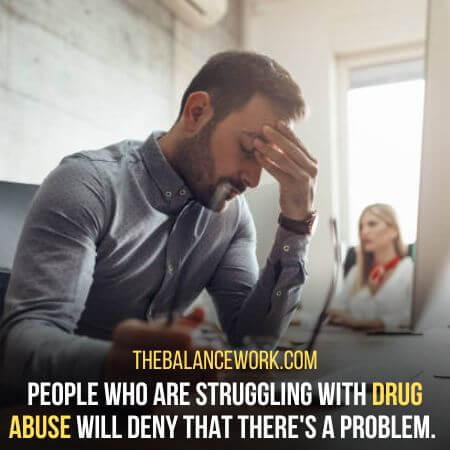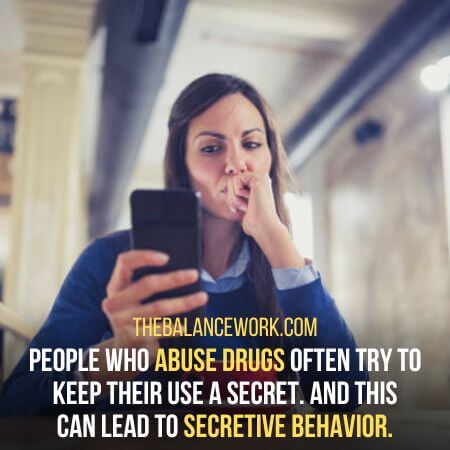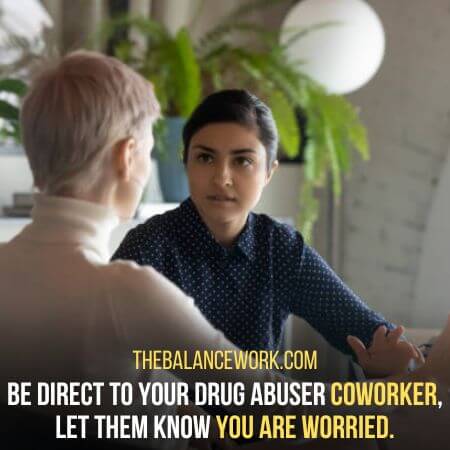Drugs and alcohol can have a significant impact on your workplace. Hostile work environments and decreased productivity are among them. But how to tell if a coworker is on drugs or alcohol?
Drug abuse has many symptoms, and not all are easy to spot. Some might be more obvious than others.
How To Tell If A Coworker Is On Drugs – 12 Ways
But it’s essential to be aware of the signs so you can address the problem before it gets out of hand.
So let’s take a look at some of the signs that may indicate that a coworker is abusing drugs or alcohol:
1. Unexplained Mood Swings:
Mood swings are one of the most common early signs of drug abuse. This means that a person’s mood can change rapidly and without warning.
One minute they might be happy, and the next, they could be angry or aggressive.
These mood swings can make it challenging to work with someone. You never know how they’re going to react to something.

And when they’re in a bad mood, the whole work environment can be uncomfortable.
But when someone is on drugs, their mood swings will be more extreme and frequent.
Sometimes, it might even seem like they’re two different people. Is that bipolar? Well, not quite.
But it is a clear sign that something is wrong.
2. Sudden Weight Loss Or Gain:
Weight loss or gain is another common sign of drug abuse. This is because many drugs can cause changes in appetite.
For example, stimulants like cocaine can suppress appetite. So if you notice that someone has lost a lot of weight recently, it could be because they’re using drugs.
On the other hand, some drugs can cause people to eat more. For example, marijuana is known to increase appetite.
Sometimes, people will use drugs in an attempt to manage their weight. For example, some people will use stimulants to lose weight.
But sudden changes and other signs on this list should be cause for concern.
3. Sudden Changes In Appearance:
People who abuse drugs often let their appearance go. They might stop showering regularly or start wearing dirty clothes.
Their hair might be unkempt, or their skin might be covered in acne. Or they might start to look much older than they are.
Sometimes, drug abusers have dark circles under their eyes. Moreover, their pupils might be dilated all the time.
These are unusual changes that can be hard to miss. Their ruffled appearance can be a sign that they’re using drugs. But they’re often early signs of drug abuse.
4. Changes In Work Performance:
If you notice someone’s work performance has changed, it could be because they’re using drugs.
For example, they might start making more mistakes than usual. Or they might stop showing up to work on time.
They might also start taking more sick days or calling in sick more often. Or they might start taking longer lunch breaks.
They may even start sleeping at their desk. These changes can be hard to miss especially if you’re used to seeing them do their job well.
All of these things can hurt the workplace. And if someone is under drugs, their work will suffer even more.
5. Unexplained Financial Problems:
Drugs can be expensive. So if you notice someone suddenly developed financial problems, it could be because they’re using drugs.
For example, they might start asking for advances on their paycheck. Or they might start borrowing money from coworkers.

They might also start selling their belongings. Or they might start stealing from the office.
These are all red flags that something is wrong. And if you notice them, it’s essential to talk to the person about it.
Usually, people who are struggling with drug abuse will deny that there’s a problem. But if you talk to them, you might be able to get them the help they need.
6. Sudden Changes In Behavior:
Changes in behavior are another common sign of drug abuse. People who abuse drugs often start to act differently.
For example, they might start to withdraw from friends and family. Or they might start to neglect their hobbies and interests.
They might also start to isolate themselves. And they might start to act more secretive and paranoid.
Hallucinations are also a sign that someone might be using drugs. Or they might start to hear things that aren’t there.
These are psychological effects of drugs that can be difficult to cope with. And they can have a significant impact on someone’s life.
7. Risky Behavior:
People who abuse drugs often start to take more risks. For example, they might start to drive recklessly.
They might start to take more financial risks. For example, they might start gambling or invest in risky ventures.
They might also start to take more physical risks. For example, they might get into fights while they’re under the influence of drugs.
Risky behavior is not thought of and can often lead to negative consequences.
You can see how these risks can add up. And they can hurt someone’s life.
8. Changes In Sleep Patterns:
Changes in sleep patterns are another common sign of drug abuse. People who abuse drugs often start to stay up late at night.
They might also start to sleep during the day. Or they might have difficulty falling asleep.
Drugs like cocaine and meth can keep people awake for long periods. Disturbed sleep patterns can have a significant impact on someone’s life.
It can make it hard for them to function during the day. And it can lead to problems at work.
Dark circles under the eyes can be a sign of sleepless nights.
Sleep patterns work by our internal clock. So when someone’s sleep patterns get disrupted, it can be a sign that something is wrong.
9. Changes In Appetite:
Changes in appetite are another common sign of drug abuse. People who abuse drugs often lose their appetite.
They might stop eating altogether. Or they might only eat enough to survive.
Drugs like meth and cocaine can cause people to lose their appetite. And when someone doesn’t eat, they can start to lose weight.
Changes in appetite can also be a sign of other health problems. For instance, someone with an eating disorder might also have a drug problem.
Or someone depressed might start to lose their appetite. However, if you notice a sudden change in someone’s appetite, it could signify that they’re abusing drugs.
10. Secretive Behavior:
People who abuse drugs often start to act more secretive. For example, they might start to keep their belongings hidden.
They might also start to lie about where they’re going and what they’re doing.
People who abuse drugs often try to keep their use a secret. And this can lead to secretive behavior.

They may hide their drugs in unusual places. Or they may try to distance themselves from their friends and family.
When someone starts to act more secretive, it can signify that they’re abusing drugs.
11. Paranoia:
Paranoia is extreme suspicion or mistrust of others. People who abuse drugs often start to act more paranoid.
For example, they might think that everyone is out to get them. They might also start to think that people are talking about them.
Or they might think that people are trying to hurt them. Paranoia can be a sign of mental illness.
But it can also be a sign of drug abuse. Paranoia is feelings of fear, anxiety, and distrust.
These feelings can make it hard for someone to function in their everyday life.
Not only that, but paranoia can lead to dangerous behavior. For example, someone who is paranoid might become violent.
12. Loss Of Interest In Activities:
People who abuse drugs often start to lose interest in the activities they used to enjoy.
For example, they might stop going to their child’s soccer games. Or they might stop going to the gym.
The things they used to enjoy might no longer bring them happiness. This is because drugs can take over someone’s life.
When someone does drugs, they might only want to be interested in the drugs themselves.
And this can lead to them losing interest in other aspects of their life.
Also, when someone is high on drugs, they might be unable to concentrate on anything else.
The only thing they can focus on is the drug they’re taking.
So these are some of the signs that someone might be abusing drugs. It is essential to identify these signs early on.
What To Do If You Think A Coworker Is On Drugs
If you think a coworker is on drugs, the best thing to do is to talk to them about it. You, however, have to approach the conversation in the right way.
Here are some tips on how to talk to a coworker about drug abuse:
1. Choose The Right Time And Place:
It would help if you chose a time and place to talk to your coworker that is private and free of distractions.
You want to be able to have their undivided attention. You also want to be able to have a conversation without interruption.
And you want to have a conversation without anyone else overhearing.
2. Be Direct:
When you talk to your coworker, you should be direct. Tell them that you’re concerned about their well-being.

And tell them that you think they might be abusing drugs. And also, let them know that you’re worried about them.
These conversations can be challenging to have. But it’s important to be direct. This way, your coworker will know that you’re serious.
3. Listen:
When you talk to your coworker, listening to what they have to say is essential. They might have a lot of feelings that they need to express.
And they might have a lot of questions. It’s important to let them talk. Let them know that you’re there for them. And let them know that you want to help.
But also let them know that you can’t help them if they don’t want to help themselves.
And also, do not judge them. Just listen to what they have to say. You will also want to take note of what they’re saying.
You might want to write it down so you can remember it later. This way, you can help them get the help they need.
4. Help Them Get Help:
If your coworker is willing to get help, you should help them. You can start by helping them find a treatment program.
You can also help them find a support group. There are many resources available. And you can find them online or through your local community.
You can also help them by being there for them. You can be a shoulder to cry on. And you can also help them by being a sounding board.
Your tiny gestures can make a big difference in their life.
Final Word:
To tell if a coworker is on drugs can be difficult. But, there are some signs that you can look for.
Their changed behavior, appearance, and loss of interest in activities can be some of the signs.
If you think a coworker is on drugs, the best thing to do is to talk to them about it.
And when you do, be direct, listen, and be there for them.
Last Updated on 4 hours by Shahzaib Arshad
- Why Does My Boss Wink At Me? 6 Potential Reasons - October 5, 2023
- Is It Legal For Your Employer To Call Your Doctor? No, But… - October 4, 2023
- 12 Ways To Deal With A Low IQ Person - September 22, 2023